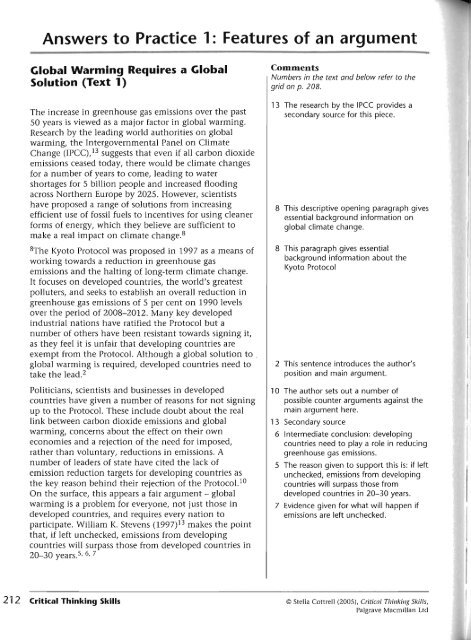Critical Thinking Skills - Developing Effective Analysis and Argument(2)
Critical Thinking Skills - Developing Effective Analysis and Argument(2)
Critical Thinking Skills - Developing Effective Analysis and Argument(2)
Create successful ePaper yourself
Turn your PDF publications into a flip-book with our unique Google optimized e-Paper software.
Answers to Practice 1: Features of an argument<br />
Global Warming Requires a Global<br />
Solution (Text 1)<br />
The increase in greenhouse gas emissions over the past<br />
50 years is viewed as a major factor in global warming.<br />
~eskarch by the leading world authorities on global<br />
warming, the Intergovernmental Panel on Climate<br />
Change (1PCC),13 suggests that even if all carbon dioxide<br />
emissions ceased today, there would be climate changes<br />
for a number of years to come, leading to water<br />
shortages for 5 billion people <strong>and</strong> increased flooding<br />
across Northern Europe by 2025. However, scientists<br />
have proposed a range of solutions from increasing<br />
efficient use of fossil fuels to incentives for using cleaner<br />
forms of energy, which they believe are sufficient to<br />
make a real impact on climate ~hange.~<br />
"he Kyoto Protocol was proposed in 1997 as a means of<br />
working towards a reduction in greenhouse gas<br />
emissions <strong>and</strong> the halting of long-term climate change.<br />
It focuses on developed countries, the world's greatest<br />
polluters, <strong>and</strong> seeks to establish an overall reduction in<br />
greenhouse gas emissions of 5 per cent on 1990 levels<br />
over the period of 2008-2012. Many key developed<br />
industrial nations have ratified the Protocol but a<br />
number of others have been resistant towards signing it,<br />
as they feel it is unfair that developing countries are<br />
exempt from the Protocol. Although a global solution to<br />
global warming is required, developed countries need to<br />
take the lead.z<br />
Politicians, scientists <strong>and</strong> businesses in developed<br />
countries have given a number of reasons for not signing<br />
up to the Protocol. These include doubt about the real<br />
link between carbon dioxide emissions <strong>and</strong> global<br />
warming, concerns about the effect on their own<br />
economies <strong>and</strong> a rejection of the need for imposed,<br />
rather than voluntary, reductions in emissions. A<br />
number of leaders of state have cited the lack of<br />
emission reduction targets for developing countries as<br />
the key reason behind their rejection of the ~rotoco1.l~<br />
On the surface, this appears a fair argument - global<br />
warming is a problem for everyone, not just those in<br />
developed countries, <strong>and</strong> requires every nation to<br />
participate. William K. Stevens (1997)13 makes the point<br />
that, if left unchecked, emissions from developing<br />
countries will surpass those from developed countries in<br />
20-30<br />
Comments<br />
Numbers in the text <strong>and</strong> below refer to the<br />
grid on p. 208.<br />
13 The research by the IPCC provides a<br />
secondary source for this piece.<br />
8 This descriptive opening paragraph gives<br />
essential background information on<br />
global climate change.<br />
8 This paragraph gives essential<br />
background information about the<br />
Kyoto Protocol<br />
2 This sentence introduces the author's<br />
position <strong>and</strong> main argument.<br />
10 The author sets out a number of<br />
possible counter arguments against the<br />
main argument here.<br />
13 Secondary source<br />
6 Intermediate conclusion: developing<br />
countries need to play a role in reducing<br />
greenhouse gas emissions.<br />
5 The reason given to support this is: if left<br />
unchecked, emissions from developing<br />
countries will surpass those from<br />
developed countries in 20-30 years.<br />
7 Evidence given for what will happen if<br />
emissions are left unchecked.<br />
21 2 <strong>Critical</strong> <strong>Thinking</strong> <strong>Skills</strong> O Stella Cottrell (2005), <strong>Critical</strong> Thiizkiilg <strong>Skills</strong>,<br />
Palgrave Macmillan Ltd



